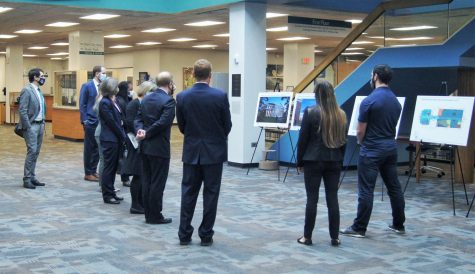UNC System President Hans visits UNCW
Recently, The Seahawk had the opportunity to interview one on one with UNC system President Peter Hans, who stopped by UNC Wilmington to tour the campus and make note of the new projects in the works.
President Hans made numerous stops on his tour including the Center for Marine Science and Randall Library where he took note of the new proposed expansion plans.
Before he moved on to his next stop, we stepped onto the campus trolley bus where The Seahawk got the chance to have a brief discussion with the President about changes on campus and the pressing issues facing all UNC universities in the near and long term.

Nicolas Ziccardi: How are you liking the renovations and proposed plans you’ve seen thus far today?
President Hans: It’s clear when you look at Randall Library, built in the 1980s when the campus was about 6,000 students, you’ve got roughly 18,000 now, you’re due for an upgrade. The plans are really impressive, they expand the amount of space students can use and calibrate; Update and refresh the look of the building. I think it’s phenomenal, we’ve got it included in the university system’s capital request, and we’re making the case for it to be funded this year by the General Assembly.
Ziccardi: Do you think schools in the system will go back to in-person learning and living by the fall and if so at full capacity?
Hans: I certainly hope so, yes. We would love for the fall to be as close to normal as possible. Now, of course, that’s going to depend on the availability and the distribution of the vaccines and the number of COVID-19 cases to continue to decline. The trends are very positive, clearly, our campuses have learned a lot about how to adapt to COVID-19, a very robust testing method regiment being at the forefront of that.
I have every reason to be optimistic about it, we’ll monitor it very closely, but we know that students benefit from, in-person, on-campus learning in addition to high-quality online offerings that we’ll continue to provide just as we did pre-pandemic.
Ziccardi: Earlier this year the board voted to increase student fees for health services and campus security starting in fall 2021. That money will address costs related to the coronavirus pandemic and the recruitment, retention, and training of campus police officers on-campus. Can you talk about the increase in student fees for next year, and where those funds are being primarily allocated towards?
Hans: The primary purposes of the health fee are targeted towards the mental health needs. The tremendous stress on everybody over the past year, the isolation, the uncertainty about the virus, additional factors with the economy, with race relations, with crazy politics, I mean you name it, it’s just been a stressful year, and we know we have to improve access to mental health for our students and that was the genesis behind that.
In terms of the campus security fee, the board felt as though making that a flexible use of funds for campuses, you know in our campuses we’ve got 17, they’re going to vary from a place to place and needs will vary from place to place, but in order to improve the quality of campus safety, to make that available, we’re held by law to a 3% increase in the overall fees each year.
So, it’s certainly at three percent or below. For the fifth year in a row we have kept in-state tuition flat. And I feel like this story has been a little missed, not by The Seahawk, you guys are ahead of that, but maybe some other places.
I don’t know that there’s another state in the country that can say that five years in a row, no increase in state tuition. I remember being your age and what that meant to me to have some certainty about the cost of higher education. We’re next going to turn our attention to the overall total cost of attendance. Like the housing and the dining and the books and everything else that plays into it,
Ziccardi: Thank you so much, President Hans.
Hans: Delighted to see you.







